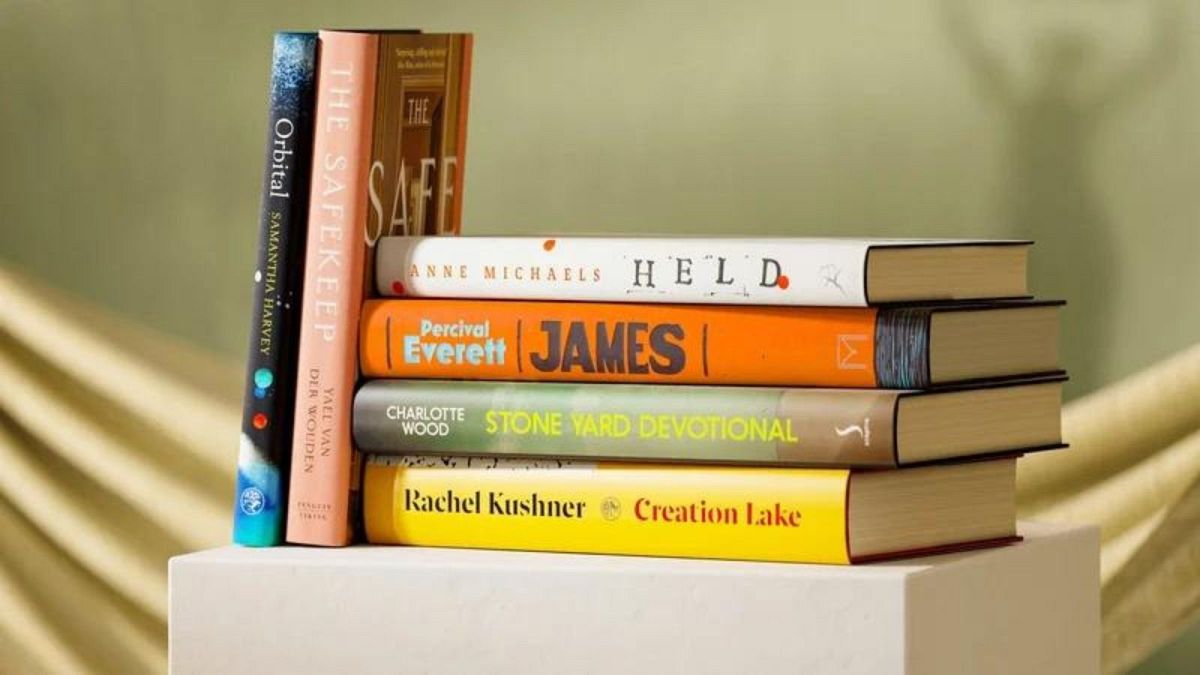This year’s Booker Prize shortlist features the highest number of female writers shortlisted in the prize’s 55-year history, as well as the first Dutch author to be shortlisted.
The 2024 Booker Prize shortlist has been announced and features the biggest number of women authors in its 55-year history.
Five women and one man have been named for the shortlist for the prestigious literary prize, which is open to works of fiction written in English by authors anywhere in the world and published in the UK or Ireland.
This year’s list also includes the first Australian author in a decade, as well as the first Dutch writer to be shortlisted. British, Canadian and American authors comprise the rest of the six-strong list.
They are:
- “James” by Percival Everett (US) – a retelling of Mark Twain’s “The Adventures of Huckleberry Finn”, written from the perspective of runaway slave Jim. Everett’s 2001 novel “Erasure” was adapted into the film American Fiction, starring Jeffrey Wright, and which won director Cord Jefferson the Best Adapted Screenplay Oscar earlier this year.
- “Orbital” by Samantha Harvey (UK) – which follows six astronauts on the International Space Station (ISS) across the course of 24 hours. The author said: “I wanted to write about our human occupation of low Earth orbit for the last quarter of a century – not as sci-fi but as realism. Could I evoke the beauty of that vantage point with the care of a nature writer? Could I write about amazement? Could I pull off a sort of space pastoral? These were the challenges I set myself.”
- “Creation Lake” by Rachel Kushner (US) – a thriller featuring a woman who infiltrates a radical anarchist collective in rural France. Kushner was previously shortlisted for the Booker Prize in 2018 for “The Mars Room”.
- “Held” by Anne Michaels (Canada) – a family saga which explores the memories of four generations. Michaels is best known for her poetry and her 1996 novel “Fugitive Pieces”.
- “The Safekeep” by Yael van der Wouden (Netherlands) – a debut novel about the treatment of Jews and a queer love story in post Nazi-era Netherlands. Her other works include a David Attenborough themed advice column. The author said that the book was inspired by “a short story I once wrote about three siblings out for dinner and the additional girlfriend everyone hates; a fascination with how the Dutch narrativise national histories; wanting to explore desire as the flipside of repulsion.”
- “Stone Yard Devotional” by Charlotte Wood (Australia) – a novel about a middle-aged woman who retreats from the world to a convent in New South Wales. Wood is the first Australian author to be shortlisted in a decade, following Richard Flanagan, who won the Booker prize in 2014 for “The Narrow Road To The Deep North”.
Each short-listed author receives £2,500 (€2,968) and the winner will win £50,000 (€59,000).
This year’s judging panel is chaired by artist and author Edmund de Waal, who is joined by award-winning novelist Sara Collins, musician and composer Nitin Sawhney, The Guardian’s Fiction Editor Justine Jordan, and writer and professor Yiyun Li.
The judges stated it was a “genuine surprise” to find that their list featured five women.
“We came up with a shortlist, we sat back and looked at the pile and someone said ‘there are five women there’,” said Collins. She described it as “such a gratifying, surprising, thrilling” moment, “especially coming off the back of the year of the three Pauls – it’s time for the Paulettes and Paulinas”, referring to last year’s shortlist which featured Paul Harding, Paul Lynch and Paul Murray.
Edmund de Waal said: “I am enormously proud of this shortlist of six books that have lived with us. We have spent months sifting, challenging, questioning – stopped in our tracks by the power of the contemporary fiction that we have been privileged to read. And here are the books that we need you to read. Great novels can change the reader. They face up to truths and face you in their turn.”
He added: “The fault lines of our times are here. Borders and time zones and generations are crossed and explored, conflicts of identity, race and sexuality are brought into renewed focus through memorable voices. The people who come alive here are damaged in ways that we come to know and respect, and we come to care passionately about their histories and relationships.”
Last year’s winner was Irish author Paul Lynch for his dystopian novel “Prophet Song” which portrayed Ireland in the grips of totalitarianism. Other recent winners include Shehan Karunatilaka, Damon Galgut, Douglas Stuart, Margaret Atwood and Bernardine Evaristo.
This year’s Booker Prize ceremony takes place on 12 November.
Additional sources • Booker Prize Foundation

